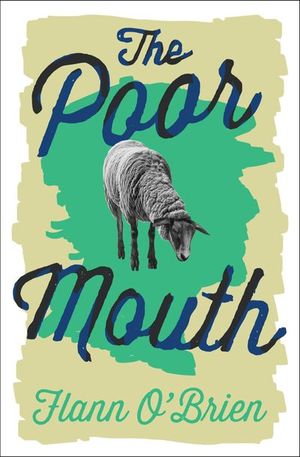The Poor Mouth
“The funniest book by Flann O’Brien. . . . Unhappiness is the comic goldmine from which he extracts The Poor Mouth’s raw material.” —The Millions
Growing up in Western Ireland, Bonaparte O’Coonassa is introduced from birth to the never-ending poverty and suffering that constitute the Gaelic character. Downpours unfailingly happen each night. Potatoes are eaten for every meal. His grandfather, Old-Grey-Fellow, regales him with tales of the ill luck and evil that have befallen the Gaels (and always will). Such is life in Corkadoragha.
From sharing a small, unkempt house with their pigs (one is too fat to fit through the door), to getting hit on the head for not speaking English on his first—and last—day of school, Bonaparte is constantly reminded of the bleak fate that awaits him as a Gael: “after great merriment comes sorrow and good weather never remains forever.”
This hilarious parody of rural Irishness “shows a comic genius working close to his best capability. Humor of this quality, this intensity, is very rare; as witty in its language as in its invention” (Newsweek).
“The Poor Mouth is wildly funny, but there is at the same time always a sense of black evil. Only O’Brien’s genius, of all the writers I can think of, was capable of that mixture of qualities.” —London Evening Standard
“A fine book, hilarious, moving, gorgeously written.” —Harper’s Magazine
“O’Brien was one of the comic geniuses of the 20th century. . . . The Poor Mouth is wildly funny.” —The Boston Globe
Growing up in Western Ireland, Bonaparte O’Coonassa is introduced from birth to the never-ending poverty and suffering that constitute the Gaelic character. Downpours unfailingly happen each night. Potatoes are eaten for every meal. His grandfather, Old-Grey-Fellow, regales him with tales of the ill luck and evil that have befallen the Gaels (and always will). Such is life in Corkadoragha.
From sharing a small, unkempt house with their pigs (one is too fat to fit through the door), to getting hit on the head for not speaking English on his first—and last—day of school, Bonaparte is constantly reminded of the bleak fate that awaits him as a Gael: “after great merriment comes sorrow and good weather never remains forever.”
This hilarious parody of rural Irishness “shows a comic genius working close to his best capability. Humor of this quality, this intensity, is very rare; as witty in its language as in its invention” (Newsweek).
“The Poor Mouth is wildly funny, but there is at the same time always a sense of black evil. Only O’Brien’s genius, of all the writers I can think of, was capable of that mixture of qualities.” —London Evening Standard
“A fine book, hilarious, moving, gorgeously written.” —Harper’s Magazine
“O’Brien was one of the comic geniuses of the 20th century. . . . The Poor Mouth is wildly funny.” —The Boston Globe
BUY NOW FROM
COMMUNITY REVIEWS

